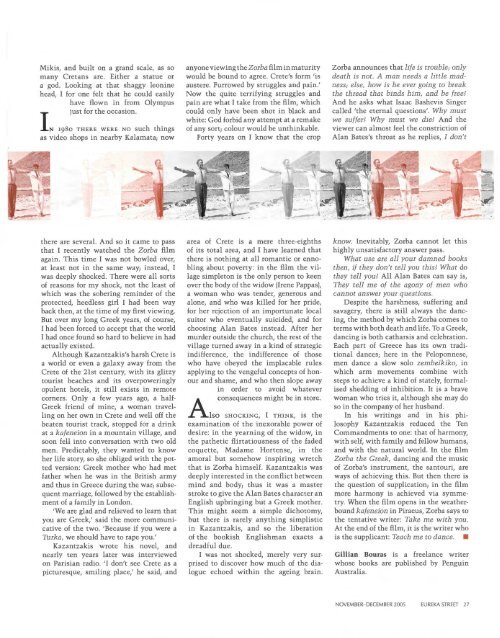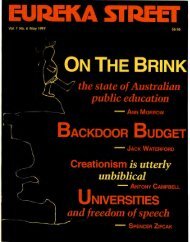0 - Eureka Street
0 - Eureka Street
0 - Eureka Street
Create successful ePaper yourself
Turn your PDF publications into a flip-book with our unique Google optimized e-Paper software.
Mikis, and built on a grand scale, as so<br />
many Cretans are. Either a statue or<br />
a god. Looking at that shaggy leonine<br />
head, I for one felt that he could easily<br />
have flown in from Olympus<br />
just for the occasion.<br />
IN<br />
1980 THERE WERE NO such things<br />
as video shops in nearby Kalamata; now<br />
anyone viewing the Zorba film in maturity<br />
would be bound to agree. Crete's form 'is<br />
austere. Furrowed by struggles and pain.'<br />
Now the quite terrifying struggles and<br />
pain are what I take from the film, which<br />
could only have been shot in black and<br />
white: God forbid any attempt at a remake<br />
of any sort; colour would be unthinkable.<br />
Forty years on I know that the crop<br />
Zorba announces that life is trouble; only<br />
death is not. A man needs a little madness;<br />
else, how is he ever going to break<br />
the thread that binds him, and be free!<br />
And he asks what Isaac Bashevis Singer<br />
called 'the eternal questions'. Why must<br />
we suffer! Why must we die! And the<br />
viewer can almost feel the constriction of<br />
Alan Bates's throat as he replies, I don't<br />
there are several. And so it came to pass<br />
that I recently watched the Zorba film<br />
again. This time I was not bowled over,<br />
at lea t not in the same way; instead, I<br />
was deeply shocked. There were all sorts<br />
of reasons for my shock, not the least of<br />
which was the sobering reminder of the<br />
protected, heedless girl I had been way<br />
back then, at the time of my first viewing.<br />
But over my long Greek years, of course,<br />
I had been forced to accept that the world<br />
I had once found so hard to believe in had<br />
actually existed.<br />
Although Kazantzakis's harsh Crete is<br />
a world or even a galaxy away from the<br />
Crete of the 21st century, with its glitzy<br />
tourist beaches and its overpoweringly<br />
opulent hotels, it still exists in remote<br />
corners. Only a few years ago, a half<br />
Greek friend of mine, a woman travelling<br />
on her own in Crete and well off the<br />
beaten tourist track, stopped for a drink<br />
at a kafeneion in a mountain village, and<br />
soon fell into conversation with two old<br />
men. Predictably, they wanted to know<br />
her life story, so she obliged with the potted<br />
version: Greek mother who had met<br />
father when he was in the British army<br />
and thus in Greece during the war; subsequent<br />
marriage, followed by the establishment<br />
of a family in London.<br />
'We are glad and relieved to learn that<br />
you are Greek,' said the more communicative<br />
of the two. 'Because if you were a<br />
Turka, we should have to rape you.'<br />
Kazantzakis wrote his novel, and<br />
nearly ten years later was interviewed<br />
on Parisian radio. 'I don't see Crete as a<br />
picturesque, smiling place,' he said, and<br />
area of Crete is a mere three-eighths<br />
of its total area, and I have learned that<br />
there is nothing at all romantic or ennobling<br />
about poverty: in the film the village<br />
simpleton is the only person to keen<br />
over the body of the widow (Irene Pappas),<br />
a woman who was tender, generous and<br />
alone, and who was killed for her pride,<br />
for her rejection of an importunate local<br />
suitor who eventually suicided, and for<br />
choosing Alan Bates instead. After her<br />
murder outside the church, the rest of the<br />
village turned away in a kind of strategic<br />
indifference, the indifference of those<br />
who have obeyed the implacable rules<br />
applying to the vengeful concepts of honour<br />
and shame, and who then slope away<br />
in order to avoid whatever<br />
consequences might be in store.<br />
A<br />
lso SHOCKING, I THINK, is the<br />
examination of the inexorable power of<br />
desire: in the yearning of the widow, in<br />
the pathetic flirtatiousness of the faded<br />
coquette, Madame Hortense, in the<br />
amoral but somehow inspiring wretch<br />
that is Zorba himself. Kazantzakis was<br />
deeply interested in the conflict between<br />
mind and body; thus it was a master<br />
stroke to give the Alan Bates character an<br />
English upbringing but a Greek mother.<br />
This might seem a simple dichotomy,<br />
but there is rarely anything simplistic<br />
in Kazantzakis, and so the liberation<br />
of the bookish Englishman exacts a<br />
dreadful due.<br />
I was not shocked, merely very surprised<br />
to discover how much of the dialogue<br />
echoed within the ageing brain.<br />
know. Inevitably, Zorba cannot let this<br />
highly unsatisfactory answer pass.<br />
What use are all your damned books<br />
then, if they don't tell you this! What do<br />
they tell you! All Alan Bates can say is,<br />
They tell me of the agony of men who<br />
cannot answer your questions.<br />
Despite the harshness, suffering and<br />
savagery, there is still always the dancing,<br />
the method by which Zorba comes to<br />
terms with both death and life. To a Greek,<br />
dancing is both catharsis and celebration.<br />
Each part of Greece has its own traditional<br />
dances; here in the Peloponnese,<br />
men dance a slow solo zembeil
















